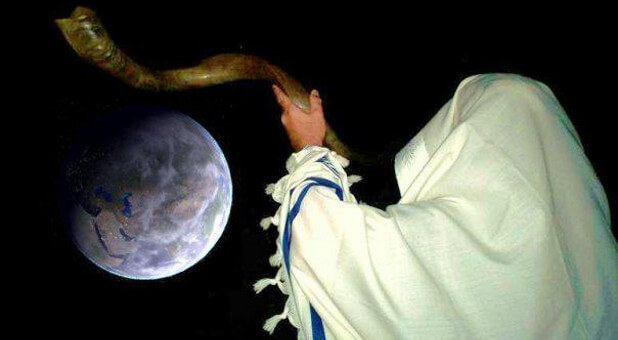In the month preceding Rosh Hashanah, Jews sound the shofar as a wake-up call and reminder that it’s time to take into account shortcomings and outright sins, and to seek forgiveness from one another and from God.
Throughout our Rosh Hashanah worship services, the shofar is sounded repeatedly, reminding us of this yet again. If we’ve hit the snooze button until now, it’s really time to wake up.
Last week, an ambulance passed by, lights flashing and sirens blaring. This happens often. I am reminded of Rabbi Joseph Telushkin’s words: “I am embarrassed to admit that, along with many others, my initial reaction to such noises is often impatience and annoyance rather than empathy. My friend Rabbi Zalman Schachter-Shalomi … suggests that whenever we hear the sound of a passing ambulance we offer a prayer that the ambulance arrive in time.”
Amen.
Yet in Israel, the ambulance siren, especially at this season, has a deeper association. Throughout Rosh Hashanah worship, we beseech God to inscribe us in the Book of Life for a year of health, prosperity and peace. We know that He is the ultimate judge, and we put our trust in Him, digging to the core of our faith with deepest sincerity that His answer be in the affirmative.
But as my rabbi in New Jersey once taught me, sometimes God answers no. We can’t understand it, and we grieve as a result. But that’s the answer.
This became very vivid as my family was shaken up this past month with the sudden death of my cousin’s husband, a warm, bright and truly delightful man who was my age.
When I hear an ambulance siren in Israel, in addition to Rabbi Teluskin’s charge, I think of how the Israeli medics, paramedics, doctors and EMTs are all part of God’s plan. If the patient is destined to live, these professional, highly trained staff and volunteers are God’s angels making sure that happens. If the patient is not destined to live, the staff responds all the same, with professionalism and deep respect for the sanctity of life. When someone dies on their watch, one can rely at least on the knowledge that she/he died with as much respect as possible and after every human effort to save the patient was exhausted.
This is sacred work for the professionals who do it. The fellowship of medical personnel everywhere know this, and we are especially grateful here. Volunteers who give their time for no compensation are heroic. Those who donate to provide the resources for the ambulances, motorbikes, equipment, buildings and of course all the blood services—and especially those who donate blood personally—are also part of this, especially here, where we don’t take these things for granted and where every life is precious and saving one life overrides everything.
As a result of past columns, I have received many personal notes and lots of support for Heart to Heart, the life-saving program I run. Those who have joined us deserve a great measure of pride and will be in my prayers.
Even if you don’t observe Rosh Hashanah and Yom Kippur according to the same Jewish tradition that I do, I pray that this thought—living Genesis 12:3 personally—accompanies you into your own prayer and reflection at this awesome season as a model, a commitment, for the year to come. May He inscribe you and all your loved ones for a year of life, health and prosperity, and all of us for peace.
On that note, as I prepare for the relative hush that will fall over Israel for three days this week, followed next week by our most sacred day, Yom Kippur, when Israelis turn to prayer rather than work, to family time rather than the daily hustle and bustle, I ask that you have us in your prayers as well. Forty years ago, the silence of Yom Kippur was broken by air raid sirens as a result of the surprise attack Israel suffered on our most sacred day. We pray that these sounds will not be heard and that we will enjoy the quiet and sanctity of the holidays, accompanied by the smell of the festive meals that go with families and friends gathering to celebrate together.
As Rosh Hashanah arrives, I pray we will not become the victim of another attack from Syria or Iran, who are threatening to destroy Tel Aviv, and that the quiet and sanctity of our holiday is not broken by another kind of siren that sends a warning of danger rather than a wake-up call for us to follow God’s commandments and live according to the principles we should.
You may find this video, made for our Heart to Heart program, particularly of interest in this context.
Finally, another sound we hope not to hear in these coming High Holidays is the sound of silence. No, not the Simon and Garfunkel hit song, but the “sound” of emergency radio airwaves that broadcast silence, set up to enable observant Jews to leave a radio on throughout Shabbat or holidays without violating the sanctity of the day, but which enable us to hear emergency broadcasts, in the event of a threat that could endanger our life, just in case.
With wishes for a year of health, happiness, prosperity and peace, and the joyous sounds of celebration, family and prayer wherever you may be.
Jonathan Feldstein is the director of Heart to Heart, a unique virtual blood donation program to bless Israel and save lives in Israel. Born and educated in the U.S., Feldstein emigrated to Israel in 2004. He is married and the father of six. Throughout his life and career, he has been blessed by the calling to fellowship with Christian supporters of Israel and shares experiences of living as an Orthodox Jew in Israel. He writes a weekly column for Charisma’s Standing With Israel.














































